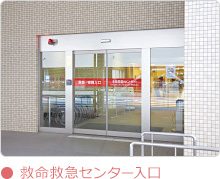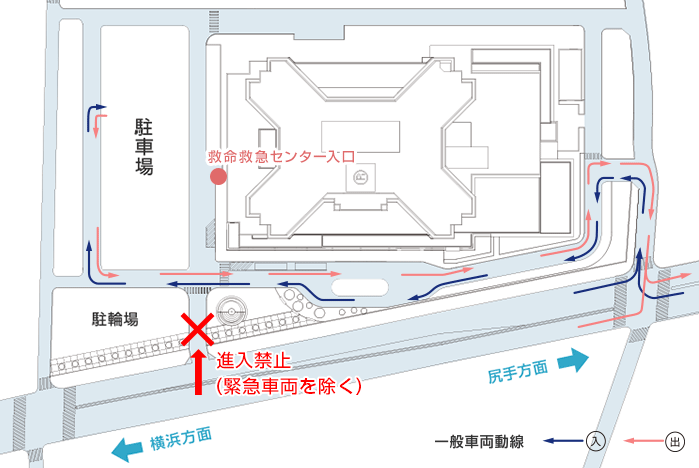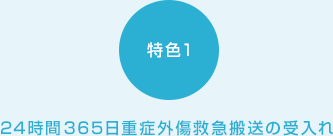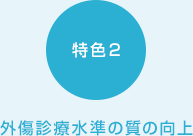
できる限り事前にお電話にてご連絡のうえ、ご来院ください。

- 症状によっては診療ができない場合があり診療までの待ち時間が長くなる場合があります。
- 重症の患者さんを優先するため、順番が前後する場合があります。
- 重症の患者さんの処置のため、軽症の患者さんの治療を一時中断させていただく場合があります。
- 可能な限り紹介状をお持ちください。お持ちでない場合は選定療養費7,700円(税込)をご負担いただきます。
- 緊急の受診の必要性は無いが、患者さんの都合により時間外診療を希望した場合に、通常の診療費とは別に時間外選定療養費7,700円(税込)をご負担いただきます。詳しくはこちらをご覧ください。
- 軽症の方はお近くの「休日急患診療所」をご利用ください。
鶴見区休日急患診療所(鶴見中央3-4-22)
TEL 045-503-3851
保険証(各種医療証、受給者証を含む)
診察券(お持ちの方のみ)
※受診時に保険証を確認できない場合、全額自己負担となりますのでご了承ください。

救命救急センター入口よりお入りいただき、救命救急センター受付にお申し出ください。
※休日および平日17:00~翌8:00までは正面入り口が施錠されています。


- 救命救急センターは、地域の最重症の救急患者さんへの対応を担っております。
横浜市内では9病院が指定され、鶴見区では東部病院が唯一の救命救急センターです。
横浜市東部地域の最後の砦としての使命を果たすべく、24時間365日あらゆる病気や外傷に対応するため、
救急専門医を中心に内科や各専門家と診療科の枠を超えて患者さん中心の救急医療を提供しています。

- 高度急性期病院の役割を果たし、ほかの医療機関で対応できない重篤な救急患者さんをスムーズに受け入れることができるよう、
地域で独自に決めた「鶴見区ルール」のもとで区内6病院と連携しています。
休日・夜間のご来院について
休日および平日17:00~翌8:00までは正面入り口が施錠されています。
この間にご来院いただいた方は、図の救命救急センター入口よりお入りください。



救命救急センター(横浜市内8病院)では、24時間365日重症傷病者の受入を行っていますが、大量の出血によるショック症状を伴う重症外傷などについては、より体制の整った重症外傷センターへ搬送することになります。救命救急センターと重症外傷センターが連携した外傷救急医療体制を構築することにより、救命率の向上を図ります。
日本外傷学会認定医が常勤で勤務し、外傷診療及び手術に対応可能な医師が 24 時間体制で院内に常駐するほか、脳神経外科医、整形外科医、心臓血管外科医等が、30 分以内に診療に参加できる体制が整っています。
重症外傷救急搬送の集約化により、外科系医師が多くの経験を積むことができ、技術力の向上が期待できます。
救急医療機関は、提供できる医療によって⼀次、⼆次、三次に分類され、三次救急医療機関が最も緊急性が⾼く重篤な患者さんの救急搬送を受け⼊れる役割を担います。
緊急事態はいつ発⽣するかわからないので、三次救急医療機関では常に空きベッドを確保しておかなければなりません。そのため、救急治療を終えた患者さんに引き続き⼊院治療が必要な場合には、他の医療機関への転院をお願いする必要が⽣じます。
そこで三次救急医療機関にあたる当院では、鶴⾒区の6病院(汐⽥総合病院、佐々⽊病院、徳⽥病院、⽣⻨病院、ふれあい鶴⾒ホスピタル、平和病院)と連携し、救急治療後の転院がスムーズにおこなえる体制を整えております。また、他の医療機関が救急搬送を受け⼊れにくい平⽇夜間や休⽇は、24時間365⽇救急医療体制が整っている当院が、率先して救急患者さんを受け⼊れています。
各医療機関がそれぞれの機能に応じた役割分担で連携し、充実した救急医療体制で地域の皆さまの命を守ることができるよう、⽇々努めております。
鶴⾒区ルール
⾼齢化に伴い救急搬送の数は年々増加しており、横浜市も例外ではありません。そのような中、患者さんのいわゆる「たらいまわし」を防ぐため、鶴⾒区では平成23年11⽉〜平成24年12⽉に「横浜市救急搬送連携⽀援モデル事業」として次のような連携を実証的に行いました。「鶴⾒区内の6つの救急隊が4回以上要請しても受け⼊れに⾄らなかった中等症以上の患者さんは、救命救急センターの機能を持つ東部病院が受け⼊れる。東部病院で急性期の治療を行った後は区内の6病院(汐⽥総合病院、佐々⽊病院、徳⽥病院、⽣⻨病院、ふれあい鶴⾒ホスピタル、平和病院)が順番で転院を受け⼊れる」というものです。このしくみにより、転院がスムーズになって空きベッドを確保しやすくなり、当院ではより多くの重症患者さんの受け⼊れが可能になりました。
この連携を事業終了後も継続し発展させたものが「鶴⾒区ルール」です。平成25年9⽉3⽇から開始し、休日夜間に当院に緊急入院した患者さんを対象としてスムーズに転院できる体制を整えました。
 輸⾎に対する東部病院の考え⽅ (相対的無輸⾎※1 / 絶対的無輸⾎※2)
輸⾎に対する東部病院の考え⽅ (相対的無輸⾎※1 / 絶対的無輸⾎※2)
当院では、「相対的無輸⾎」の⽴場で診療を⾏っております。
当院では、患者さんとの信頼関係を第⼀に考えて、医療⾏為の実施にあたり、⼗分な説明と同意(インフォームド・コンセント)に努めております。その中で、宗教的理由などから輸⾎を拒否される患者さんがおられます。私たちは、無輸⾎または必要最⼩限の輸⾎で診療を⾏っておりますが、⼿術をはじめとする診療中に「⽣命の危機」が⽣じ、医師の倫理にもとづき輸⾎をせざるを得ないと判断した場合においては、宗教的理由などから輸⾎を拒否される患者さんに対しても、輸⾎を実施する⽴場を取っています(いわゆる「相対的無輸⾎」)。当院では、「相対的無輸⾎」の⽴場で診療を⾏ってまいりますので、ご理解のうえご協⼒のほどお願い申し上げます。
-
※1 相対的無輸⾎
患者さんの意思を尊重して可能な限り無輸⾎治療に努⼒するが、「輸⾎以外に救命⼿段がない」事態に⾄ったときには輸⾎をするという⽴場・考え⽅。
-
※2 絶対的無輸⾎
患者さんの意思を尊重し、たとえいかなる事態になっても輸⾎をしないという⽴場・考え⽅。
















